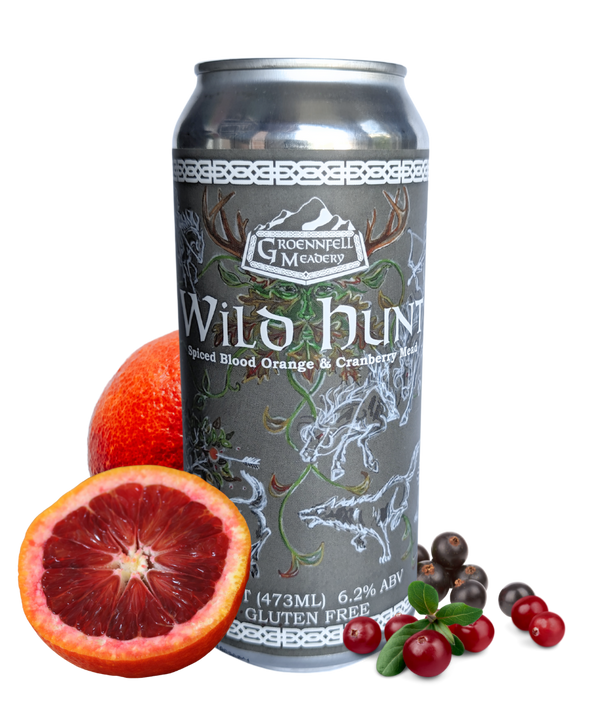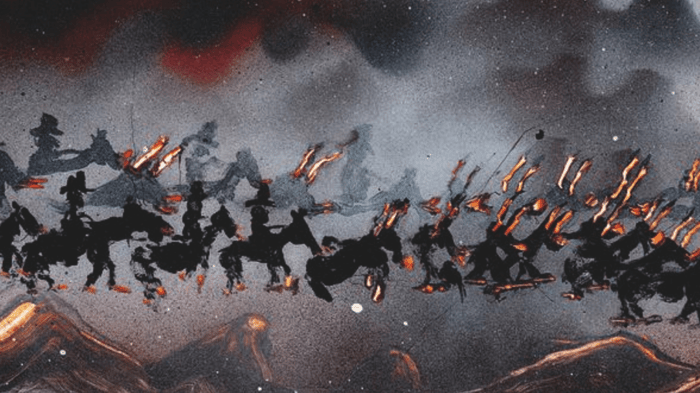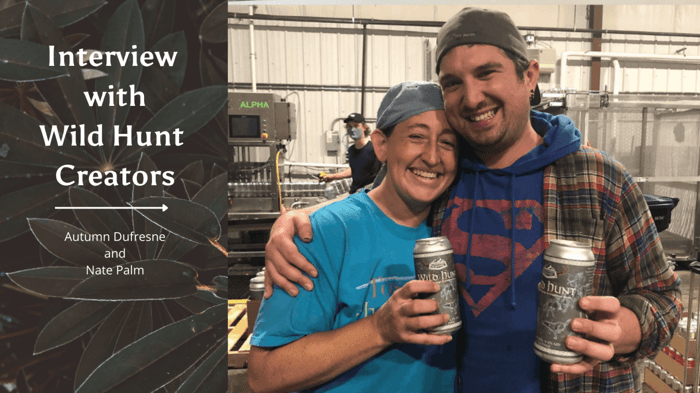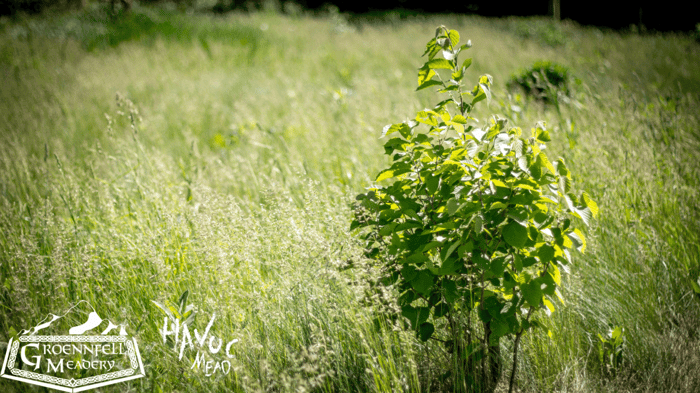Our Wild Hunt mead is perhaps our most popular seasonal brew. We get customers asking for its return all year long. But we only brew it in autumn. Why? It's not just because we find the taste of spiced blood orange and cranberry to be more delicious at that time of the year.

(And it pairs very well with seasonal fare. Just ask Certified Meadiac Ian M.!)
Let’s ask Senior Brewer, Nate Palm: "The name Wild Hunt was chosen for two reasons. One was timing. The [mythological] Wild Hunt takes place leading up to the winter solstice. Since my hope for this brew was to lead us through autumn into the winter, I found it fitting. My second reason is honestly just my love for the mythos of The Hunt."
So what is that mythos?
Wild Hunt - Fall Seasonal Mead by Groennfell

$18.99
As the thundering of the Wild Hunt approaches, mortals make their peace. And as the hooves recede into the distance for another year, the silence brings a time to appreciate the bounty of the harvest. Wild Hunt is a balanced… read more
What is the Wild Hunt?
Even if you aren't a celebrating pagan or a folklorist, you might still be peripherally aware of the concept of the Wild Hunt. Though it is a very ancient concept, it has trickled down into today's media in many forms.
For example, in the popular MTV show Teen Wolf, a faction known as the Wild Hunt becomes the main antagonist in season 6. It shows up in modern novels from all sorts of genres, including Tamsin by Peter S. Beagle, Jim Butcher's Dresden Files, The Wicked Lovely series by Melissa Marr, and Booker prize nominee The Riders by Tim Winton. Tolkien included at least two: one in The Silmarillion and one in The Hobbit. Multiple operas, including a very famous Wagner, have been written about the Hunt. There's a Wild Hunt in the Marvel comics; in Dungeons and Dragons; and two separate Magic: The Gathering cards are named for the event. There is a Wild Hunt in the Elder Scrolls: Skyrim video game. And there's even an entire Witcher game named after it. And let's not even talk about all the songs inspired by the Hunt (although Ricky the Meadmaker will recall perhaps the most famous one below).

(A very cool depiction of the Norse Wild Hunt from Bryan F. Rosado)
Simply put, the Wild Hunt is exactly what it sounds like: a hunt. Though, in this case, it's put on by the fae, or by the gods, or elves, or by spectral warriors ready to have a good time.
It's not always a good time for everyone though.
What Happens at the Wild Hunt?
Picture this: you're headed home alone on an autumn or early winter evening, perhaps after having a few drinks with friends at the local tavern. Your belly is full of meat and your head is swimming with mead. You have had a successful harvest and are prepared for the harsh winter months ahead.
All of a sudden, loud noises overtake you -- the baying of hounds, the hollering of horns, the thundering of hooves, and the shouting and laughter of people. You run and hide in the frozen bracken, but they are already on your trail. No matter where you go, you cannot seem to lose them.
 (Oromë, the head huntsman of the Valar in J.R.R. Tolkien's Silmarillion, painted by sempermoi)
(Oromë, the head huntsman of the Valar in J.R.R. Tolkien's Silmarillion, painted by sempermoi)
Leading the Wild Hunt is the head huntsman. Sometimes it’s Odin or his English counterpart, Wodan. Sometimes it’s Oberon, King of the Faeries; or Cernunnos, the Celtic Horned God. It might even be Artemis or Diana. The head huntsman may be riding a horse or a dragon or even a giant hound. They may be headless, like the Irish dullahan or the spirit who tormented Ichabod Crane. Whoever they are, they’re absolutely terrifying to you.
You run all night, only to return home exhausted in the morning.
Sure, it could be a handy excuse for someone who imbibes a little too much mead and then gets lost in the snowy woods at night, only to return disheveled and half-frozen in the morning.
But for many of our ancestors, it was quite a bit more than that.
What Does The Wild Hunt Mean?
The Wild Hunt was a moment when the veil was at its weakest. It’s no coincidence that it shares its timing with the Catholic tradition of All Soul’s Day and the Celtic traditions of Samhain. During the Wild Hunt, mortal and beyond-mortal are able to interact on the same plane of existence. The Hunt is a time when the dead come riding, and to ride and party with the gods is the highest honor the dead can be given.
After all, traditionally a hunt wasn’t just a time for pursuing quarry for the sake of meat. It was a time of joy. It was a time for folk of all kinds to come together in sport and play. It was a time for challenge and joviality with neighbors and friends. And most importantly, it was a time for feasting -- and you know we here at Groennfell love nothing more than a feast!

(A depiction of Ghost Riders in the Sky by John Erickson)
But there’s one very specific and nefarious rule about the Wild Hunt: it’s no place for mortals. In fact, in many of the myths, particularly those where the head huntsman is one of the fae folk, the quarry of the Wild Hunt is mortal man.
Sometimes, seeing the Wild Hunt meant instant death (again, an easy way to explain someone getting lost in the woods and freezing to death). Sometimes, it was an ill omen or a portent of war, famine, or disease to come. But for all mortals, one thing is clear: if you even think you hear the Wild Hunt, you’d better get inside, pull the blankets over your head, and hope you aren’t the quarry.
Where Does the Hunt Take Place?
The Wild Hunt is traditionally seen as a Northern European folklore motif. It has a history in places like Scandinavia, Germany, and the British Isles. But many cultures all over the world have their own takes on the Hunt. An early modern record of the Wild Hunt as a motif was by Jacob Grimm of Grimm's Fairy Tales fame. But less-modern versions have been around as long as humans have been recording their thoughts, dreams, fears, and feelings.
Most cultures, even those as far away from the Wild Hunt's traditional epicenter as the Aztec or the many cultures of the Indian subcontinent, have a god or (very often) goddess of the hunt. Those gods usually have some kind of celebration -- perhaps a feast day or other holiday -- where they are known to gather up all their attendants and go riding. And a lot of times, those celebrations tend to fall around the same time as the traditional Wild Hunt. Nearly every culture has some sort of legend about why you shouldn't be around when the gods/spirits/elves/etc. go hunting at night.

(A depiction of the Hawaiian Night Marchers from puzzleboxhorror.com)
For example, in Hawai’i, there is a particularly haunting ghost story about entities known as the Night Marchers (or huaka'i po). These Marchers are often headed by a long-dead king -- their own head huntsman. The legend goes that if you are out in the mountains at night and you hear the beating of the drums, you must immediately fall to your knees, put your face in the dirt, and close your eyes. For any mortal who sees a Night Marcher (and is not related to one among the party) will be immediately killed.
Ricky's Final Word
Interested in learning more about this mead? Read this interview I did with label artist Autumn Dufresne and Senior Brewer Nate Palm. But I asked Ricky the Meadmaker if he had any thoughts to contribute about the mythos of this popular mead.
Ricky: “When Nate first handed me this beverage and told me the name, I thought it was truly inspired! The name is so fitting with its references to Scandinavian and Germanic myths and the balanced spice profile of the mead calls up cool fall days from my time in Denmark.
"I love the myth because it has survived for centuries - if not millennia - in a hundred forms, speaking to a deep feeling in human beings. I mean, consider that Ghost Riders in the Sky, a song made famous by Johnny Cash in 1979, is a reference to the same experience that the Brothers Grimm talked about. It's amazing."
Whatever originally inspired the Wild Hunt to our ancestors all over the world, it has continued to stay with us through modern times. Which makes it the perfect inspiration for our Wild Hunt mead.
Want to learn to brew Wild Hunt Mead yourself? Check out our clone recipe.




